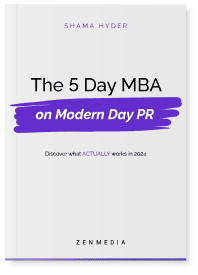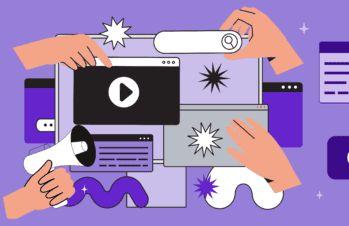The new Facebook Graph Search (a search feature being rolled out slowly to Facebook users that lets you draw connections between people, their profile information and their interests on Facebook) has again raised the question of separating personal and professional usage of social media.
For some entrepreneurs, like Zen Media CEO Shama Kabani, a strong personal brand (268,342 Facebook subscribers, 30,000 Twitter followers, 500+ 1st degree LinkedIn connections) predates the development of a strong professional and business brand. In her best-selling book, The Zen of Social Media Marketing, Kabani writes that each social media user has to make a choice about how much separation (if any) they want between their personal and professional lives online.
She says, “I resisted creating an official Facebook page for The Zen Media Group for a long time. As the CEO, I wanted people to be able to connect with me personally. However, people started “liking” The Zen Media Group without us even setting up a page for it. After 50 likes, it was obvious that the people had spoken. They wanted us to have a presence on Facebook. So we ‘claimed’ the company, and now have an official company fan page as well.”
But what about those who work for large corporations, or wish to separate their personal and professional social media use? Is it even possible to draw the line online? The answer may depend on what industry you work in, and how well established your personal and professional identifies are when you decide to sever them.
What’s in a Name?
One of the easiest ways to separate your personal and professional or business use of social media is to use different names for the profiles, and divide your social media use between them. For instance, if you have had a personal Twitter account as @MyNameIsJane, and you’re beginning to tweet on behalf of your company, set up a new Twitter account as @CompanyNameJane. That’s the strategy that many entrepreneurs and executives use.
Just don’t forget that a search on your name is likely to link you to your company (as well as to past employers), and don’t post anything online that you don’t want associated with your professional reputation. Always make sure that you know how you are logged in, and what the privacy settings are on the account you are using. For example, if you have a personal Facebook account as well as a Facebook Page for your business (or a fan page if you are a writer, public figure, or CEO), make sure that your personal profile is set to Friends only, and limit what you post on your Facebook Page to business-related posts and images.
Who Do You Want to Be Online?
The truth is that most of us can no longer truly separate our personal life from our professional life on social media. But we can decide who we want to be in our online community. As Elwood P. Dowd says in the classic film Harvey, “In this world, you must be oh so smart or oh so pleasant. Well, for years I was smart. I recommend pleasant. You may quote me.”
One of the best ways to create the online personality you want is to decide how you want the world to see you, and then edit your profile information to make sure that it only has information you want your boss, coworkers, clients, colleagues, and potential investors or business partners to see. And don’t forget old profiles on sites you no longer use (like MySpace). Google never forgets, so you can’t afford to, either.
This chart shows the pros and cons of different social identity strategies:
| Strategy | Pros | Cons |
| One Profile, All Social Media Networks | Simple, easy Builds a well-rounded online identity Updates all your contacts at once | You might need to be more reserved about what you post You might inadvertently give too much information to professional contacts |
| Separate Personal & Professional Profiles | Helps with work-life boundaries Less fear of colleagues or boss seeing details you might not want to share Messages on each accounts are more relevant to different sets of contacts | Tricky to maintain – be vigilant about what account you are posting to Harder to see or share contacts across accounts
|
| Use Separate Services for Different Purposes | Same benefits as having separate accounts on each network, but a bit less confusing | Harder to share or see updates across all your contacts Takes longer to manage |
Beware of Alphabet Soup Regulations
If you work in a regulated industry such as banking, education, financial services, healthcare, insurance, or in any government agency or branch of the military, you may not have a choice about how and when you use social media for personal or professional purposes. That’s because there is an alphabet soup of regulatory agencies that have different standards on what is – and isn’t – permitted.
For example, FINRA, the organization that regulates the financial services and insurance industries, has said that there is no difference between personal and professional use of the Web for anyone who falls under its jurisdiction. Other agencies have clearly spelled out rules that people in the industries that they regulate must follow in order to separate professional and personal use of social media.
How do you know where your company falls in this confusing landscape of competing regulations? Start with your trade association or industry group. They can steer you toward the guidelines that apply to your business.







